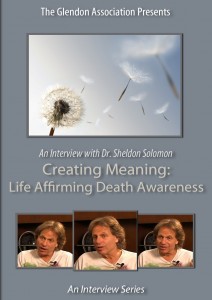Dr. Sheldon Solomon Discusses the Makings of An Ideal Society: Exclusive Interview
The following transcript contains part of an exclusive interview with Dr. Lisa Firestone and Dr. Sheldon Solomon.
Sheldon Solomon describes the elements of an ideal society.
SS:And so here, if I recall accurately, we talk about three things: borrowing heavily from Becker, where he said, “OK, first and foremost, is, you know, does the culture provide for the material needs of its constituents, given its current level of technology and access to natural resources?” And I’m pretty sure here he’s borrowing from Maslow’s bottom part of the hierarchy of needs. You know, we are physical creatures that require fundamental, fundamental physical sustenance. You know, everything from food to water to places to live and so on and so forth. And he says, “Well, one way we can judge a culture is, well, how well does the culture do that?” And, you know, in this respect, he actually, this is the 1970’s, and I don’t think I would argue he’d change his mind today, he said, “You know, we can do a lot better.” You know, no country in principle is better able to take care of all of its people than the United States. And you know, yet here we are, I don’t know what the numbers are, but I think about one third of the American population is impoverished and 10% go to bed hungry every night and, you know, the unemployment rate and so on and so forth. And he’s like, “Well, that would be – that’s a demerit.”
And, his point being that, OK, Somalia can’t be held to the same standards as America because different countries have different degrees of technical expertise and access to the raw materials. Alright, but then, a la Maslow, he just says, “OK, but people don’t live by bread alone. So, we need a second standard and that’s to what extent does a culture provide social roles with appropriate standards of conduct that enable as many people as possible to feel like they’re significant or worthy participants in the cosmic cultural scheme of things to which they subscribe?” And in his language, that’s self-esteem. I think there are other words one might use for that and I don’t know if the terminology matters that much. But, you know, Becker called that the “dominant human motive,” this need to believe that we’re persons of value in a world of meaning, which is, by the way, just an extension psycho-dynamically of the love and basic trust that the attachment people, that Bob talks about as just being the fundamental nutrients that nourish the soul and without which we’re unable to stand up every day. And so here Becker would say, “Well, alright, you know, Christianity, for example as a grotesque caricature of a stereotype, Christianity in the Middle Ages, you know, said everyone is potentially eligible for salvation.
It doesn’t matter if you’re the king or a dipstick for a cesspool, if you do the right thing and if you care for your fellow humans, if you do unto others as you would like them to do unto you, regardless of your moral transgressions, good things will happen in the afterlife. And Becker’s point was – I’m not trying to propose that we go back to the good old days of shoveling shit in the Middle Ages, but his point was that psychologically, there were opportunities to obtain and maintain self-esteem back in the day. Similarly, Erich Fromm in his Escape from Freedom, you know, talks about, again, without glamorizing or over-romanticizing the old days, “Well, you know, back in the Industrial – before the Industrial Revolution, people did stuff with their hands. And so, if you were a shoemaker, you would make, like, an entire shoe. And, then, when you got done, the person who wore those shoes, you know, they would literally, that would be a tangible manifestation of your unique creative abilities as a human being.” And, his point, and this is also one of Marx’s basic points in his early days, was, “That’s got to feel good that there were these opportunities that were profuse through the entire social order where everyone could feel good about themselves. Well, now, if we fast forward a couple of hundred years, an unintended consequence of the Industrial Revolution as you know was the transition from crafts-person-ship to mass production. So now, you don’t make a whole shoe anymore.
You put the left hubcap on the front wheel of the Ford Escort as it goes through the assembly line and there’s no opportunity to feel good about what you do as a result of your daily efforts. And then, on top of that, because of the diminution of belief in religion, even though we need to qualify that because America is certainly a religious country, be that as it may, we still tend to measure people by their fiscal resources. And this is what I would argue is particularly true for males and so if you’re a male in American society, then, you know, it’s how much cash do you have. You know, my kind of glib joke is you can look like Donald Trump, like the purple gruesome hair and you still have like the six young babes dangling off each of your arms because, you know, money talks and bullshit walks. And for women, maybe arguably even harder because you’ve got to be young and thinner than a piece of linguini, and that’s impossible, too. And so the point that we make just borrowing from Becker extensively is that, Geez, you know, in America, our kids are taught at a very early age to adhere to a set of values that is not realistically attainable for the average individual. And so it shouldn’t surprise us that, you know, a third of the American population is depressed and another third is addicted to drugs and alcohol and the final third watching television or shopping at Wal-Mart for a chain saw and a lemon. And so that would be his second point, is, does the culture deliver the psychological goods as well as the physical ones? Then the kind of kicker for both Becker and in our work is: can you accomplish those things without undue harm to either other people in different cultures or designated inferiors in your own?
And I know it’s a tired example, but I think it’s a good one and one that most people are still very familiar with and that would be Hitler. Now, he comes to power in Germany, gets elected, by the way, not directly but his party was. German economy is in tatters at the time and he definitely got the trains running and the economy moving. Definitely made the German people feel pretty good about themselves and it’s just that ugly fact that 100 million people perished in the process. And, that can’t be good. And, you know, the same thing, forgetting about Hitler for a moment, you know, just when we look at the United States, you know, we always appear to have someone or something domestically that just serves as the all encompassing repository of evil. So back in the old days, it was the Communists and then it was, well, who knows what it was from time to time, depending on who you ask, it’s the old people or the non-English speaking people. I think the gay and transsexual people. Now, it’s Islamic people. I think the point is relatively simple and that is can we construct a social order whereby people can feel good about themselves without having to disparage somebody else in order to do so. And that remains, frankly, for me, kind of a chilling question. You know, is there a belief system that is strong enough to stand on its own merits and does not require setting itself up in opposition to something else. Because I think we’re in trouble if the answer to that query is, “No.” But we shall see.
Order a DVD of Dr. Sheldon Solomon’s full interview with PsychAlive, “Creating Meaning“
 In this DVD, Dr. Sheldon Solomon addresses a variety of topics concerning how human beings can create meaningful lives in the face of death. In a lively and candid style, Dr. Solomon discusses the development of Terror Management Theory, the ways in which people form defenses against death anxiety and the concept of life affirming death awareness, arguing that we can “accept the reality of the human condition and parlay that into bringing out the best in us. ” He also addresses the societal effects of death awareness, including the social nature of human beings, the role of education and government, and the elements that make up an ideal society. Ultimately, Dr. Solomon advocates that people treat one another humanely and with a greater emphasis on compassion.
In this DVD, Dr. Sheldon Solomon addresses a variety of topics concerning how human beings can create meaningful lives in the face of death. In a lively and candid style, Dr. Solomon discusses the development of Terror Management Theory, the ways in which people form defenses against death anxiety and the concept of life affirming death awareness, arguing that we can “accept the reality of the human condition and parlay that into bringing out the best in us. ” He also addresses the societal effects of death awareness, including the social nature of human beings, the role of education and government, and the elements that make up an ideal society. Ultimately, Dr. Solomon advocates that people treat one another humanely and with a greater emphasis on compassion.
Tags: attachment, culture, depression, dominant human motive, ideal society, psychological goods, self-esteem, self-worth, society, value










Leave a Reply